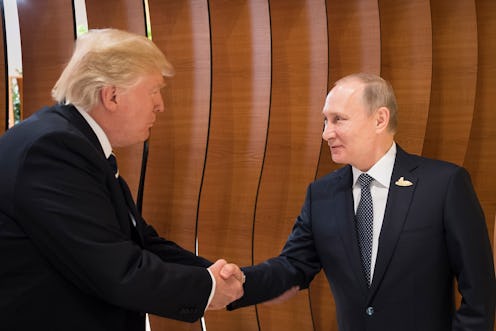News
Putin's Intense Nuclear Weapons Speech Has People Worrying About A Cold War 2

If you're wondering whether the United States and Russia are entering a Cold War redux, you're not alone. Speculation began swirling about a second arms race between the two nuclear giants after the president of Russia gave an update on Thursday about Russia's nuclear weapons. In a televised state of the nation just weeks before his presidential reelection race, Vladimir Putin announced that Russia has developed and is testing new and advanced weapons that could render the U.S. missile defense system "useless."
This speech led some alarmed people to predict that Russia and the United States will plunge into a new Cold War. “You didn’t listen to our country then,” Putin said during Thursday's address. “Listen to us now.”
But Putin denied he was trying to start a second Cold War. The Kremlin leader sat down for an interview in Moscow with Megyn Kelly, host of NBC's Megyn Kelly Today. Kelly began the segment by asking, "Several analysts in the West have said this is the declaration of a new Cold War. Are we in an arms race right now?"
Putin responded:
My point of view is the individuals who have said that a new Cold War has started are not analysts; they do propaganda. If you were to speak about arms race, then an arms race began at exactly the time and moment when the U.S. opted out of the Anti-Ballistic Missile Treaty.
During his state of the nation address, Putin had shown a video and animations of a nuclear-powered, intercontinental ballistic missile (or ICBM) that would be able to outmaneuver U.S. defenses, plus other weapon systems including nuclear-powered cruise missiles and underwater drones. Russia developed these weapons in response to the United States pulling out of the 1972 Anti-Ballistic Missile Treaty, Putin said in his speech.
The now defunct treaty, signed under Richard Nixon's presidency, was an arms control treaty between the United States and Soviet Union. The treaty, which stayed in effect during and after the 1980s Cold War era, limited the number of anti-ballistic missile complexes and number of anti-ballistic missiles allowed at each complex. After the dissolution of the Soviet Union, the mandate continued with the Russian Federation, Ukraine, Belarus, and Kazakhstan holding up the former USSR's end of the treaty. But in 2001, then-President George W. Bush withdrew the United States from the treaty so that the U.S. national missile defense system could be built. Although he and Putin signed a new treaty, the new agreement no longer constrained the number of nuclear warheads.
Now less than 20 years later, Putin was on NBC to claim, "Every single weapons system that I have discussed today easily surpasses and avoids a missile defense system." While "some of them still have to be fine-tuned and worked on, others are already available to the troops and battle-ready," he added.
While there is no verification so far proving his claims about Russia's new ICBM (Putin did not show a video of missile's successful test), the Russian president insisted on NBC that it's the real deal:
All of those tests were successful. It's just each of these weapons systems are at a different stage of readiness. One of them is already on combat duty. It's available to the troops.
Jeremy Bash, a former chief of staff of the U.S. Defense Department and CIA under President Barack Obama, described today's era to NBC as one where "you're going to see Russia rise, and that could spark a new Cold War." Others are skeptical of a new Cold War, however, and believe Putin is putting on a show of bravado ahead of Russia's election, which he is expected to win.